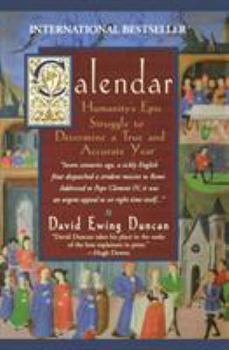Calendar:: Humanity's Epic Struggle to Determine a True and Accurate Year
Select Format
Select Condition 
Book Overview
The adventure spans the world from Stonehenge to astronomically aligned pyramids at Giza, from Mayan observatories at Chichen Itza to the atomic clock in Washington, the world's official timekeeper since the 1960s. We visit cultures from Vedic India and Cleopatra's Egypt to Byzantium and the Elizabethan court; and meet an impressive cast of historic personages from Julius Caesar to Omar Khayyam, and giants of science from Galileo and Copernicus...
Format:Paperback
Language:English
ISBN:0380793245
ISBN13:9780380793242
Release Date:June 1999
Publisher:Harper Perennial
Length:352 Pages
Weight:0.60 lbs.
Dimensions:0.8" x 5.3" x 8.1"
Customer Reviews
5 ratings
Fascinating and very readable
Published by Thriftbooks.com User , 20 years ago
Many books on the topic of time, calendars, and, in an unsuprisingly related way, papal history have so much to tell given the vast scope of years involved that their authors either just scratch the surface, leaving the reader wanting more, or tell lengthy, complicated anecdotes about select occurences, leaving the reader scratching his head and wondering how the events are related. Duncan does an admirable job of telling the history like, of all things, a STORY. The myriad names and places somehow settle into a pattern that makes the disparate chapters makes sense together. Certain editorial license is take by Duncan, as well, which adds to the reader's enthusiasm in speeding through the chapters. It's a quick read and a great re-read.
Sheding light on a mystery
Published by Thriftbooks.com User , 21 years ago
This book is a must read for anyone who enjoys quarky history books. Not only is it an excellent source for learning all about the calendar, but it follows the maintenence of the calendar all through the dark ages and it sheds a lot of light on the dark ages. The reasons for why are calendar is what it is today is facinating history and Duncan presents it in a way that captures the reader.
How we measure time
Published by Thriftbooks.com User , 24 years ago
Perhaps for many people the thought of reading about time and how it is measured doesn't have quite the attraction it did a year ago with the Millenium bug looming before us. But David Ewing Duncan's book is great fun and well worth a look in.This book is about the tricky old problem all calendar makers have been posed with in the past - which is our solar and Lunar cycles are quite different, and neither of them are quite handy enough to fit into each well without there being odd days, minutes and seconds left over. This has meant that a variety of ways of making calendars have developed.This book is more than just a look at our Western calendar though- it is an interesting historical and cultural look at how we measure time. From simple agricultural calendars, to more complex early South American ones - and the odd ones such as the French Revolutionary Calendar which sprung up at the end of the eighteenth century. How each of them developed, the elements which influenced them and their development through time.It is a fascinating, gutsy but quick read which draws all the elements together which make our calendars today.
Great World History lesson!
Published by Thriftbooks.com User , 24 years ago
I found this book comprehensive as well as entertaining! Calendar is thorough review of World History, from pre-Egyptian to the present day. Mr. Duncan teaches his reader about the way humans have tried to keep track of time from early man to the present time, and he does this in a way that is both informative and entertaining. He does not talk down to his readers, instead, he tells his reader a story of how and why we have such a desire to control time. It is fascinating to see how man has tried to measure the length of a year, and how, in each century, he's gotten just a little bit closer. You will never look at the Calendar or your clocks the same way again!
The Best Book for the Rest of Us
Published by Thriftbooks.com User , 24 years ago
This is a great reference for general readers. As other reviews suggest, specialists can pick nits; mathematicians will know more math than the author presents, astronomers more astronomy, and historians more history. The rest of us will get as much of them as we want, explained understandably. A fascinating book.






